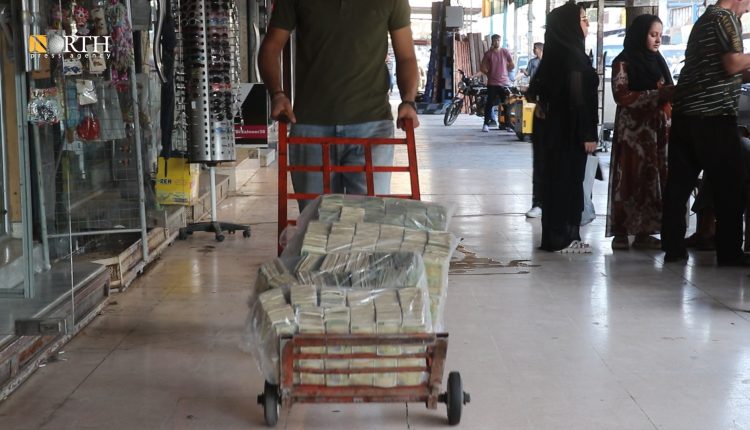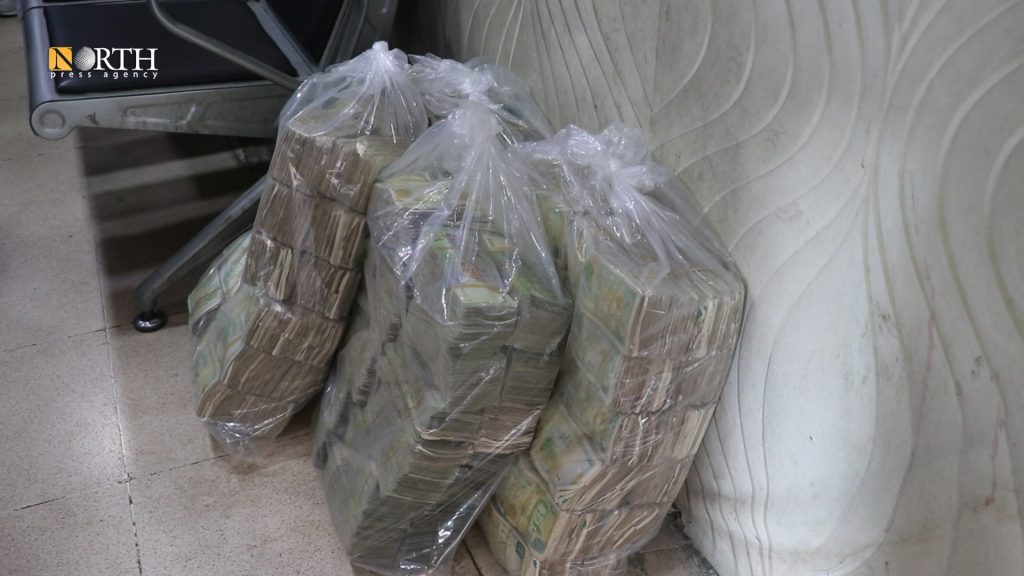
By Nalin Ali
QAMISHLI, Syria (North Press) – In the city of Qamishli in northeastern Syria, the severe devaluation of the Syrian pound has led to dramatic changes in how residents handle money. People find themselves carrying heavy sacks of Syrian currency when exchanging it for U.S. dollars, struggling to fit large banknotes into their pockets.
Ahmad finds himself burdened with a hefty sack of Syrian currency whenever he heads to exchange it for U.S. dollars at the exchange offices in Qamishli. This is a consequence of the Syrian pound’s dramatic devaluation—losing 99 percent of its value since the onset of the Syrian conflict.
As you stroll through the markets, you might observe cars and carts overflowing with bags of Syrian money. It is not uncommon to see bundles of these notes being transported on stretchers between exchange shops.
Conversely, at the exchange offices, you will often see individuals leaving with black bags filled to the brim with Syrian currency. The notes are so large that fitting them into pockets is virtually impossible.
Devalued currency
Ahmad Hassan, a resident of Qamishli, tells North Press that Syrian money has effectively lost its value. He explains that they exchange a $100 bill and end up with a bag full of Syrian currency.
Hassan adds that the situation is cumbersome, so he prefers to use dollars when shopping for essentials as carrying dollars is simply more practical.

He notes that the drastic devaluation of the Syrian pound has led to a bizarre scene in the city’s markets. Cars are often seen loaded with cash, and residents frequently lug large bags of money to buy everyday items, he says.
Alan Othman, a shop owner in Qamishli, echoes this sentiment, pointing out that the severe decline in currency value forces residents to carry unwieldy amounts of cash when shopping.
Weighing money
Othman explains to North Press that, in the absence of a money counter, they often use an electronic scale to weigh large sums of money. Due to the sheer volume of banknotes, counting them by hand is impractical, so weighing them has become a practical alternative.
He also notes that they have come to know that 100,000 SYP (equals about $6) weighs approximately 100 grams. This method helps them quickly gauge amounts, especially since rising prices force residents to carry substantial sums or use dollars for transactions.
In contrast, Khalid Sheikhi, a currency exchange office owner in Qamishli, criticized this practice. He points out that weighing money can be problematic due to the condition of the banknotes—some are torn, worn, or taped, leading to inaccuracies in weight and thus potentially in the amount being measured.
Convenient
Sheikhi observed that many residents prefer using dollars for transactions, finding it lighter and more convenient.
With the Syrian pound’s severe depreciation due to the economic collapse, most transactions in markets and shops are now conducted in dollars, Sheikhi says.
He adds that many locals depend on remittances, which has led to heavy foot traffic at remittance and exchange shops in the city.

Sheikhi also mentions that exchange shops keep bags on hand for customers. Because the Syrian pound is so large and cumbersome, residents often struggle to carry it in their pockets. Providing bags makes it easier for them to transport their cash. Furthermore, he explains that due to the bulkiness of the currency, many people opt to transport their money by car. A single bag can hold up to 6 million SYP, making it impractical to carry such a large amount while navigating the market.
